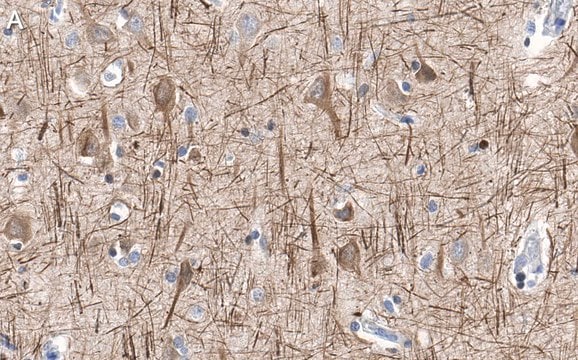추천 제품
생물학적 소스
mouse
결합
FITC conjugate
항체 형태
purified from hybridoma cell culture
항체 생산 유형
primary antibodies
클론
NE14, monoclonal
양식
buffered aqueous solution
분자량
200 kDa
종 반응성
pig, feline, chicken, bovine, human, mouse, guinea pig, rat
포장
antibody small pack of 25 μL
농도
~1 mg/mL
기술
immunohistochemistry: 1:200-1:400 (4-8 ug/mL) using enzyme treated formalin-fixed, paraffin-embedded rat Cerebellum sections
배송 상태
dry ice
저장 온도
−20°C
타겟 번역 후 변형
unmodified
유전자 정보
human ... NEFH(4744)
일반 설명
Neurofilaments are type of intermediate filaments (IFs) that serve as major elements of the cytoskeleton supporting the axon cytoplasm of neuronal cells. IFs are components of most eukaryotic cells and significantly differ from other cytoskeletal elements of the cell, namely microtubules and microfilaments.
특이성
Monoclonal Anti-Neurofilament 200, also known as Neurofilament-H or Heavy subunit, specifically recognizes the phosphorylated H tail of Neurofilament 200 and shows no reactivity on enzymatically dephosphorylated neurofilaments.2 The antibody shows reactivity with neurofilaments in the central and peripheral nervous systems from human1, pig1, mouse3, rat4, chicken3, guinea pig3, feline3 and bovine3 origin.
면역원
Neurofilaments purified from pig spinal cord
애플리케이션
The antibody may be used in various immunochemical techniques including Immunohistochemistry and Immunoblotting (~200 kDa).1-7
생화학적/생리학적 작용
Neurofilaments undergo post-translational modifications including different levels of phosphorylation, which has been suggested to modulate their function by influencing the interaction between neurofilament and cytoplasmic organelles. Neurofilaments are built from three intertwined protofibrils of apparent molecular weights [68 (L), 160 (M) and 200 (H) kDa] which are themselves composed of two tetrameric protofilament complexes of monomeric proteins. Neurofilament 200 also known as Neurofilament heavy polypeptide (H-subunit), NF-H, NEFH or 200 kDa neurofilament protein, has an important function in mature axons that is not subserved by the two smaller neurofilament proteins.
물리적 형태
Supplied as a solution in 0.01 M phosphate buffered saline pH 7.4, containing 15 mM sodium azide as a preservative.
저장 및 안정성
For continuous use, store at 2-8°C for up to one month. For extended storage, freeze in working aliquots. Repeated freezing and thawing is not recommended. If slight turbidity occurs upon prolonged storage, clarify the solution by centrifugation before use. Working dilution samples should be discarded if not used within 12 hours. Protect from prolonged exposure to light.
면책조항
Unless otherwise stated in our catalog our products are intended for research use only and are not to be used for any other purpose, which includes but is not limited to, unauthorized commercial uses, in vitro diagnostic uses, ex vivo or in vivo therapeutic uses or any type of consumption or application to humans or animals.
적합한 제품을 찾을 수 없으신가요?
당사의 제품 선택기 도구.을(를) 시도해 보세요.
Storage Class Code
10 - Combustible liquids
WGK
nwg
Flash Point (°F)
Not applicable
Flash Point (°C)
Not applicable
가장 최신 버전 중 하나를 선택하세요:
D Dahl
Journal of neuroscience research, 20(4), 431-441 (1988-08-01)
Neurofilament phosphorylation in rat nervous system development was studied by indirect immunofluorescence with monoclonal antibodies reacting with phosphorylated epitopes in tissue sections and in primary dissociated cultures. The antibodies either decorated neurofilaments shortly after their appearance or after a considerable
E Debus et al.
Differentiation; research in biological diversity, 25(2), 193-203 (1983-01-01)
A panel of 10 mouse monoclonal antibodies specific for glial fibrillary acidic protein (GFA) has been isolated using porcine GFA as antigen. Although all antibodies recognize GFA purified from porcine spinal cord in the western blot technique, they can be
G Shaw et al.
European journal of cell biology, 42(1), 1-9 (1986-10-01)
The work of the Sternbergers and their colleagues has shown that monoclonal antibodies reactive with neurofilament subunit proteins may be sensitive to the state of phosphorylation of these proteins. We therefore examined the ability of our previously described panel of
Y-L Liu et al.
Spinal cord, 47(2), 166-170 (2008-07-30)
Observational cross-section study. The objective of our study was to determine if phosphorylation of aggregated neurofilaments (NFs) would occur in autoimmune-mediated motor neuron injury. Our main hypothesis was that autoimmune-mediated damage of spinal cord motor neurons may influence NF phosphorylation
Ben G Szaro et al.
Trends in neurosciences, 33(1), 27-37 (2009-11-13)
Neurofilament (NF) protein expression is coupled to axon development and the maintenance of neuronal homeostasis. Here, we present evidence that this tight regulation depends critically on post-transcriptionally regulated changes in NF mRNA transport, translation and stability. Recent studies have shown
자사의 과학자팀은 생명 과학, 재료 과학, 화학 합성, 크로마토그래피, 분석 및 기타 많은 영역을 포함한 모든 과학 분야에 경험이 있습니다..
고객지원팀으로 연락바랍니다.







